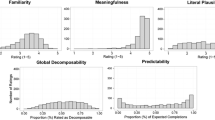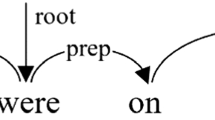Abstract
An idiom is a collection of words whose meaning as a whole cannot be determined from the meanings of the individual words. As such, idioms pose a problem for the psychological process of interpretation, but psychologists have shown interpretation of idioms to be fast. A hallmark of idioms is their resistance to syntactic variation, and some idioms are more resistant than others. Idioms that are low in resistance are termedflexible, and they tend to be more familiar to users of the language, combinedr=.401, combinedp=.02. Some syntactic variations are moredisruptive than others are, and the disruptiveness of variations agrees well with a prediction by Fraser (1970), combinedr=.897,p<.01. Furthermore, 86% of the judgments of the acceptability of 41 idioms in 7 to 8 syntactic variations by 103 Harvard undergraduates agree with a strong proposal by Fraser (1970) that if a particular syntactic variation of an idiom is acceptable, then all relevant variations equally or more disruptive are also acceptable. The localization of the 14% disagreement in either competence or performance will have considerable implications for cognitive psychology and linguistics.
Similar content being viewed by others
References
Boatner, M.T., Gates, J.E., & Makkai, A. (1984).A dictionary of American idioms (2nd ed.). Woodbury, New York: Barron's Educational Series.
Chafe, W.L. (1968). Idiomaticity as an anomaly in the Chomskyan paradigm.Foundations of Language, 4, 109–127.
Cutler, A. (1982). Idioms: The colder the older.Linguistic Inquiry, 13, 317–320.
Estill, R.B., & Kemper, S. (1982). Interpreting idioms.Journal of Psycholinguistic Research, 6, 559–568.
Fraser, B. (1970). Idioms within a transformational grammar.Foundations of Language, 6, 22–42.
Gibbs, R.W., Jr. (1980). Spilling the beans on understanding and memory for idioms in conversation.Memory and Cognition, 8, 149–156.
Gibbs, R.W., Jr., & Gonzales, G.P. (1985). Syntactic frozenness in processing and remembering idioms.Cognition, 20, 243–259.
Glass, A.L. (1983). The comprehension of idioms.Journal of Psycholinguistic Research, 12, 429–442.
Healey, A. (1968). English idioms.Kivung, 1, 71–108.
Kemper, S. (1986). Inferential processing and the comprehension of idioms.Metaphor and Symbolic Activity, 1, 43–55.
Michiels, A. (1977). Idiomaticity in English.Revue des Langues Vivantes, 43, 184–199.
Newmeyer, F.J. (1972). The insertion of idioms. InPapers from the eighth regional meeting (pp. 294–302). Chicago: Chicago Linguistic Society.
Newmeyer, F.J. (1974). The regularity of idiom behavior.Lingua, 34, 327–342.
Ortony, A., Schallert, D.L., Reynolds, R.E., & Antos, S.J. (1978). Interpreting metaphors and idioms: Some effects of context on comprehension.Journal of Verbal Learning and Verbal Behavior, 17, 465–477.
Rosenthal, R., & Rosnow, R.L. (1984).Essentials of behavioral research. New York: McGraw-Hill.
Schweigert, W.A. (1986). The comprehension of familiar and less familiar idioms.Journal of Psycholinguistic Research, 15, 33–45.
Swinney, D.A., & Cutler, A. (1979). The access and processing of idiomatic expressions.Journal of Verbal Learning and Verbal Behavior, 18, 523–534.
Wasow, T., Sag, I.A., & Nunberg, G. (1984). Idioms: An interim report. InProceedings of the XIIIth International Congress of Linguists (pp. 102–115). The Hague: CIPL.
Author information
Authors and Affiliations
Additional information
This research was funded in part by a graduate student research fund provided by the Department of Psychology, Harvard University. The article is a short version of the author's doctoral thesis with the same title. I am sincerely grateful to Keith Holyoak, Donna Jo Napoli, Miriam Schustack, and Roger Brown for their advice on various stages of experimental design. I am also grateful to Roger Brown, Monica Harris, Robert C. Crowder, Peter C. Gordon, Eliott Mordkowitz, and Elizabeth Weiss for helpful comments on earlier drafts. Douwe Yntema, Robert Rosenthal, and Don Rubin graciously provided helpful suggestions on data analysis for which I am also grateful.
Rights and permissions
About this article
Cite this article
Reagan, R.T. The syntax of English idioms: Can the dog be put on?. J Psycholinguist Res 16, 417–441 (1987). https://doi.org/10.1007/BF01073271
Accepted:
Issue Date:
DOI: https://doi.org/10.1007/BF01073271




